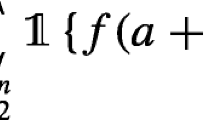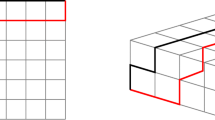Abstract
We study the random composition of a small family of O(n 3) simple permutations on {0,1}n. Specifically we ask what is the number of compositions needed to achieve a permutation that is close to k-wise independent. We improve on a result of Gowers [8] and show that up to a polylogarithmic factor, n 3 k 3 compositions of random permutations from this family suffice. We further show that the result applies to the stronger notion of k-wise independence against adaptive adversaries. This question is essentially about the rapid mixing of the random walk on a certain graph, and we approach it using a new technique to construct canonical paths. We also show that if we are willing to use a much larger family of simple permutations then we can guaranty closeness to k-wise independence with fewer compositions and fewer random bits.
Preview
Unable to display preview. Download preview PDF.
Similar content being viewed by others
References
Aldous, D., Fill, J.A.: Reversible markov chains and random walks on graphs, http://stat-www.berkeley.edu/users/aldous/RWG/book.html
Barenco, A., Bennett, C.H., Cleve, R., DiVincenzo, D.P., Margolus, N., Shor, P., Sleator, T., Smolin, J.A., Weinfurter, H.: Elementary gates for quantum computation. Phys. Rev. A 52(5), 3457–3467 (1995)
Cameron, P.J.: Permutation groups. London Mathematical Society Student Texts, vol. 45. Cambridge University Press, Cambridge (1999)
Chung, F.R.K., Graham, R.L.: Stratified random walks on the n-cube. Random Structures Algorithms 11(3), 199–222 (1997)
Cleve, R.: Complexity theoretic issues concerning block ciphers related to D.E.S. In: Menezes, A., Vanstone, S.A. (eds.) CRYPTO 1990. LNCS, vol. 537, pp. 530–544. Springer, Heidelberg (1991)
Coppersmith, D., Grossman, E.: Generators for certain alternating groups with applications to cryptography. SIAM J. Appl. Math. 29(4), 624–627 (1975)
Dixon, J.D., Mortimer, B.: Permutation groups. Graduate Texts in Mathematics, vol. 163. Springer, New York (1996)
Gowers, W.T.: An almost m-wise independent random permutation of the cube. Combin. Probab. Comput. 5(2), 119–130 (1996)
Jerrum, M.: Counting, sampling and integrating: algorithms and complexity. Lectures in Mathematics ETH Zürich. Birkhäuser, Basel (2003)
Maurer, U., Pietrzak, K.: Composition of random systems: When two weak make one strong. In: The First Theory of Cryptography Conference (2004)
Sinclair, A., Jerrum, M.: Approximate counting, uniform generation and rapidly mixing Markov chains. Inform. and Comput. 82(1), 93–133 (1989)
Vaudenay, S.: Adaptive-attack norm for decorrelation and super-pseudorandomness. In: Heys, H.M., Adams, C.M. (eds.) SAC 1999. LNCS, vol. 1758, pp. 49–61. Springer, Heidelberg (2000)
Author information
Authors and Affiliations
Editor information
Editors and Affiliations
Rights and permissions
Copyright information
© 2004 Springer-Verlag Berlin Heidelberg
About this paper
Cite this paper
Hoory, S., Magen, A., Myers, S., Rackoff, C. (2004). Simple Permutations Mix Well. In: Díaz, J., Karhumäki, J., Lepistö, A., Sannella, D. (eds) Automata, Languages and Programming. ICALP 2004. Lecture Notes in Computer Science, vol 3142. Springer, Berlin, Heidelberg. https://doi.org/10.1007/978-3-540-27836-8_65
Download citation
DOI: https://doi.org/10.1007/978-3-540-27836-8_65
Publisher Name: Springer, Berlin, Heidelberg
Print ISBN: 978-3-540-22849-3
Online ISBN: 978-3-540-27836-8
eBook Packages: Springer Book Archive




